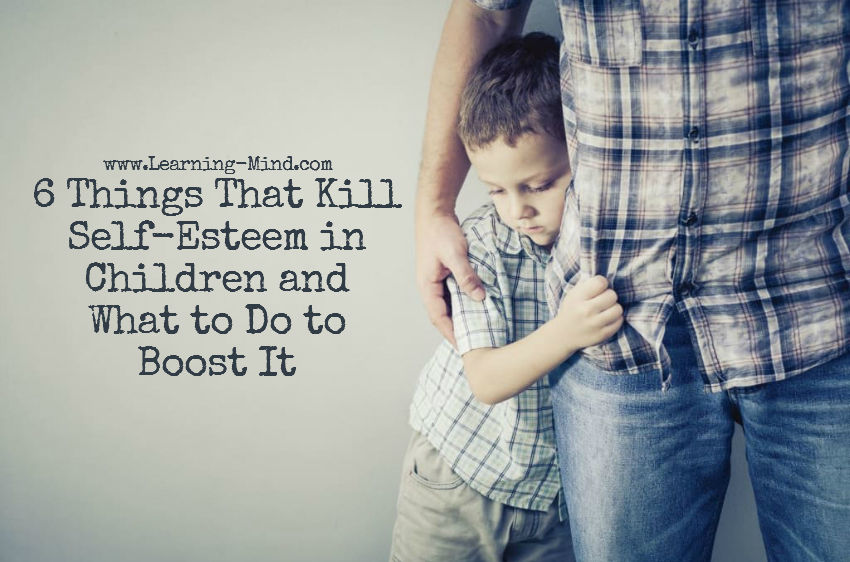
Children’s self-esteem can be negatively affected by certain things their parents do, without even realizing that. Are you guilty of any of these parenting behaviors?
Self-esteem in children is much more vulnerable than it is in adults. For this reason, some early childhood experiences and parenting habits may have a profound effect on later development of a child’s personality.
When raising a child, parents tend to focus on providing the essential survival basics and quality education with the purpose of creating the best opportunities that could allow their offspring to develop into an independent, accomplished adult.
Undoubtedly, these factors have a high impact on a child’s growth if we were to look at the first two hierarchy needs proposed by Maslow’s pyramid (i.e. physiological and safety needs). Needless to say, in order to help a child reach a stable level of happiness, parents must ensure to fulfill their psychological needs with the same determination as to the basic ones.
Subsequently to physiological and safety needs, Maslow suggested that an individual must feel loved, appreciated, acknowledged for their qualities and achievements. Such recognition should come from family members when a child puts effort into accomplishing something, no matter how big or small the goal may be.
Since parents are primary caregivers and implicitly role models, they have a significant influence on a child’s emotional stability and self-esteem.
“Self-love,” or “self-esteem,” can be defined as the way a person perceives him/herself. It is something that influences every aspect of an individual’s life (relationships, career choices, self-management, etc.).
Children learn the first lessons about self-esteem from their parents. So it is very important for them to help their offspring develop high levels of self-esteem from a very young age.
As a matter of fact, a study conducted by the University of Washington confirms that self-esteem is formed and consolidated from the first years of childhood (more precisely around the age of 5). These findings deny the idea that self-esteem is formed mainly during adolescence.
Being a parent can be the hardest job in the world. No one has an instruction manual at hand, or universal valid guidelines to follow. We rely on common sense, love, instinct, and sometimes on the advice of experts.
However, there are some mistakes which parents often commit. Studies reveal that these mistakes can turn children into problematic, anxious, aggressive or depressed adults and ruin their self-esteem.
A study conducted by Vanderbilt University in 1997 found that parents who psychologically control their children can hinder their self-esteem and self-confidence.
Encouraging children – and especially adolescents – to be independent is important. It improves their ability to manage and resolve conflicts and to have good interpersonal relationships. Furthermore, having greater independence leads to an increase in the capacity to withstand external pressures.
The helicopter parenting style can have a negative effect on self-esteem in children. This type of parents often deprives their children of learning certain survival skills, especially when they feel frustrated, disappointed or stressed.
In addition, helicopter parenting also undermines children’s ability to become flexible in certain situations and confident in themselves. Most of the time, these children lack the freedom to explore, discover and pursue new challenges.
Irregular hours of sleep could negatively affect a child’s brain development. It has been scientifically proven that going to bed late or going to different times is related to problems of hyperactivity, misconduct at school, emotional difficulties.
Parent-child communication is very important, and it is often the role of the parent to initiate it. A parent must be careful when the child is willing to listen and try at that time to start a conversation with him/her: in the car, after the meals, in the morning while the child prepares to go to school, before bedtime, etc.
It is the parent who initiates the conversation because it shows to the child that the parent is involved in his/her development and that s/he cares about what is happening in a child’s life. Once a week, ideally, the parent should find time for an activity to do with the child.
It is absolutely normal as a parent to want your child to do and be the best. But you have to avoid the trap of always being unhappy about what the child does, becoming too critical and negative.
Don’t let your desire turn you blind and ignore the successes s/he has achieved so far. Don’t create unrealistic expectations because they always lead to disappointment.
When the parents do not get along, the child suffers. They become worried and frustrated and start searching for solutions to make their parents happy again.
The child will be emotionally distressed and insecure about his/her future. They may lose their appetite or have troubles playing or sleeping. In most cases, children tend to feel guilty for adult quarrels.
Some children may feel distrustful of their own strengths and abilities. Sometimes, to build their self-confidence, it’s enough to repeat that they can succeed.
The simple fact that your child knows you trust them will help them face their fears, insecurity and at the same time develop their own self-esteem.
It may happen that we feel overwhelmed by the constant chatter of the little ones. But when they want to communicate something, it’s good to listen to them carefully.
Maybe we do not fully understand their thoughts and emotions. But by paying attention to their needs and what they have to say, they will know that we really care.
Adults make mistakes too and these are far bigger than a child’s mistakes. Yet, we learn to forgive them. Similarly, when your child does something wrong, do not criticize him/her. Suggest new ideas or help them understand the consequences of their actions.
“Confidence comes not from always being right but from not fearing to be wrong.”
– Peter T. Mcintyre
How do you support your child’s self-esteem?
References: